A Fascinating Historical View on the Authoritarian Parenting Style and Deep Insights into Controlling Parents
 • Read about the historical rise of the authoritarian parenting style and how old Victorian values of strict emotional control still characterize the central 'moral' core of authoritarian parenting!
• Read about the historical rise of the authoritarian parenting style and how old Victorian values of strict emotional control still characterize the central 'moral' core of authoritarian parenting!
• In this light of old Victorian values, you'll get a good understanding of how the mindset of authoritarian parents works and why they see and treat their children like they do!
• Get deep insights into the long term effect of being a child of authoritarian parents!
When Looking at the Authoritarian Parenting Style through the Window of History, This Style of Parenting Is Actually a Step UP in Empathy
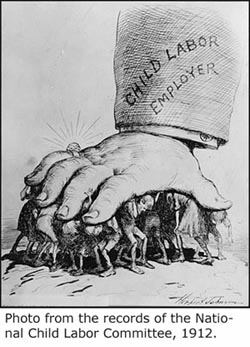
I will not be exaggerating when I say that 'being a child' during the course of history has been nothing less than a rollercoaster ... one that has mostly been going downwards.
If we look at what children have been exposed to during the course of time: e.g. child ritual sacrifice by e.g. the Incas, routine oblation of children to monasteries in the Middle Ages, tight swaddling to restrict the infant, severe child beating because of the common belief that a child was a container of evil and therefore must kept down, daily enemas to verify that the child wasn't possessed, child labour and child slavery etc. - authoritarian parenting can actually be seen as a step up the evolutionary ladder of child rearing.
The Early 18th Century Seeds of Authoritarian Parenting:
- It's about Controlling the 'Inside'
Rather Than the 'Outside'!
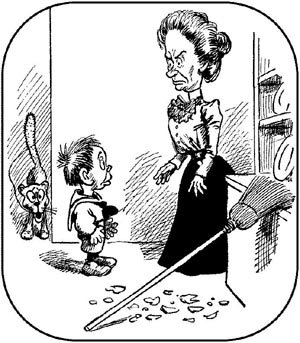
I think we can see the early seeds of the authoritarian parenting in the 18th century.
At that point in time, parents in the Western world (particularly the British) began taking the first steps toward a mind shift and become more involved in their children's upbringing.
Western parents stopped seeing their child as a potential representation of dark and evil forces that had to be kept in check physically (harsh beatings etc.) and instead started to try and control their minds, their feelings, their needs.
Along with the morally strict Victorian age came the conviction that anything that just remotely smelled of feelings, desires or needs etc. had to be repressed or controlled!
Children's behavior was controlled by the means of guilt, threats and spanking but also other forms of punishments like being locked up in dark closets or dark rooms.
So strict control of children was definitely still there, it had just changed its face. It had gone from being more physical to more mental / emotional.
The Authoritarian Motto, "A Child Must Be Trained and Controlled!"
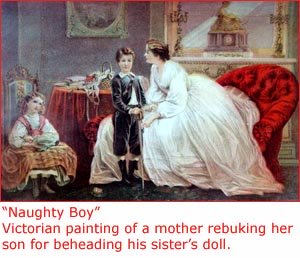
Victorian or early authoritarian parents weren't strict because they didn't care about or didn't love their children.
No, they would say that they were strict exactly because they did care: They cared about raising their child in what they saw as the proper spirit of good social education!
It was not about raising children that were happy from the inside.
No, it was about 'teaching' children! Teaching them to look good from and do well on the outside.
The Early 20th Century 'Behavioral' Approach:
- "Showing Love is Dangerous"
The first half of the 20th century reflects the birth of a more 'scientific' approach to child rearing than what had ruled before, like pure tradition, superstition etc.
In 1928 American behavioral psychologist
John Broadus Watson
wrote "In Psychological Care of Infant and Child". In this work he, among other things, warns against using "too much mother love" in child rearing as it may lead to spoilt children.
Thinking that showing love and affection is 'dangerous' is central to the mindset inherent in the
authoritarian parenting style.
Diana Baumrind Was the First to Put a Label on Strict Parenting
In the early 1960's Diana Baumrind conducted her all time famous long term study of Western middle class child care practices.She followed more than 100 families and her study ended with her definition of 3 parenting styles: The
permissive parenting style, the
authoritative parenting style, and the authoritarian parenting style.
Values, Behavior and Belief System of Authoritarian Parenting
The following description of authoritarian parenting has a firm basis in Diana Baumrind's study.However, it's written in my voice and I freely weave in my own knowledge and philosophical insights.
Why the Tight Emotional Control Backfires for the Authoritarian Parents
Various parenting manuals started to appear in the early twentieth century. These parenting manuals were occupied with children's emotions, particularly those of fear, anger and jealousy.However, the manuals weren't proponents of accepting children's emotions.
Children's emotions were to be rejected because they were seen as bad, even destructive of order, predictability and sound moral. Even a positive feeling such as love was potentially dangerous.
The entire Western culture was focused on controlling these 'dangerous' emotions - an idea which has been prevalent throughout most of this century.
In much the same vein authoritarian parents don't recognize their children's emotional needs.
In fact, emotions are considered a sign of weakness because 'you're not in control of yourself'.
Emotions are 'childish' and childish is bad because it ... once again, reflects someone out of control.
However, as most of us know, emotions, particularly the powerful ones, cannot be suppressed forever.
Therefore the archetypical authoritarian parent will display an outwardly emotional 'coolness' and 'detachment'.
However, most human cannot just put a lid on their emotions forever. When emotions are repressed, they tend to bottle up inside and end up exploding, BAM!
Therefore the typical authoritarian behavior pattern is that of two extremes: Of both being emotionally distant and unavailable AND that of being angry and intrusive.
The Child is a Like a Mini-Adult!
- Authoritarian Parenting is Adult-Centred
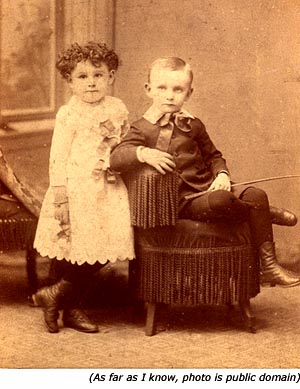
These authoritarian (or Victorian) ideals of emotional control obviously colored authoritarian parents' view on the 'ideal' child.
An ideal child is not really a child but more like a 'mini-adult': There are high expectations of 'mature' behavior: e.g. not been needy or emotional and willing to obey and follow orders
The authoritarian parenting style is therefore adult-centred and not about meeting children's emotional needs. The children have to live up the parents' goals: be well-behaved, get a good education, get a high status job etc.
In order for the child to live up to these 'adult' standards, authoritarian parents have to 'train' their children's minds:
They train their kids' minds by installing the firm belief that they are accepted and given attention if they do well and will be punished if they don't.
This adult-centred parenting style is the direct opposite of today's attachment parenting style where the focus is on bonding with your child, to get to know your child emotionally so that you can fulfil your child's needs.
The Child Must Learn to Respect Authorities!
- Using Fear as Discipline Tool!
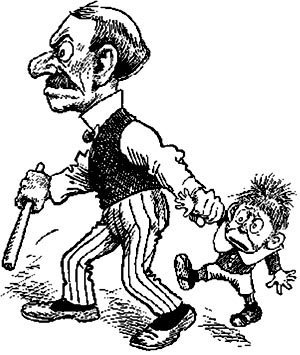
The mind of an authoritarian parent likes order, neatness, routine and predictability.
Authoritarian parents have a firm belief in authority figures and authority systems. These are entities that are not questioned. Everybody has a place in the system and authoritarian parents are typically very conformist and norm abiding.
This dependence on order and predictable systems is reflected in authoritarian parenting.
The authoritarian parenting style is characterized by many rigid rules that are upheld with threats and punishments.
The child has to learn respect to authorities and systems: "Know thy place"!
In this way authoritarian parents seek to 'prepare' their children to do well in the societal system.
They give their children plenty of household responsibilities in order for their child to develop what they perceive as a healthy work ethic.
In what is probably the best of meaning authoritarian parents work hard to discipline their children so that they can become hardworking, respectable but also fearful and submissive citizens.
The Child Is Judged and Measured!
- Everything Is Black and White!
Authoritarian parents orient themselves in a world of absolutes. Everything is categorized in 'right' and 'wrong', 'black' and 'white'.
A child is not just a child but is either a good child or a bad child, a well behaved child or a naughty child.
This means that the child is looked upon with a critical eye that judges and evaluates whether or not the child lives up to the predefined expectations. Needless to say this kind constant evaluations is highly stressful.
The Child Is to Behave as an Adult but Is not Treated as Such
- The Authoritarian Paradox!
Yes, there's an interesting paradox inherent in authoritarian parenting:
Children are expected to show mature, adult behavior.
However, they are not in any treated as equals.
Authoritarian parents tend to be intolerant and closed (discussion or give and take dialogue is in no way encouraged) and be disrespectful (consistently overruling of their kids' emotional needs).
So authoritarian parents may create what will become a law-abiding citizen but the lack of the adult skills of making good choices and taking full responsibility of one's own life are only some of the unfortunate consequences of this adult-centred parenting style.
The Effect on Kids (In Western Families)
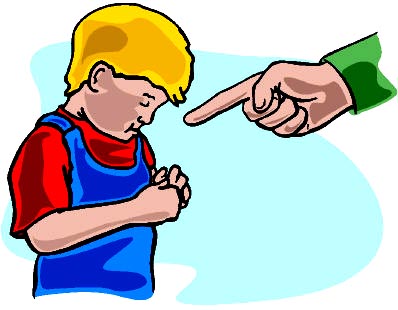
"If I Don't Do What Is Said, I Will Be Punished"
- The Effect of Conditional Parenting
Children of authoritarian parents tend to do well in school and are said to generally not engage in drinking or drug use. They know the consensus rules and follow them.
Children of authoritarian parents have learnt to try and live up to their parents' and other authorities' expectations. Not because they feel like it, but they're afraid not to.
To use an expression from the business world, one could say that authoritarian parenting is "management by fear". The tool of fear is very effective but is also very damaging for the children.
Basically they learn that they are not 100% accepted. They have learnt that they are only accepted when they are being 'good'. This is what is meant by conditional parenting. It's only the 'nice' part of their personality, their nice feelings that they are 'allowed' to show.
Their parents' unacceptance of their entire person, immediate color the children's self image.
It may result in low self esteem and self hatred because the children get angry with themselves when they have 'unacceptable' feelings and desires.
"My Feelings Are Bad, I Must Repress Them"
- No Experience with Handling Emotions
Kids raised in the authoritarian parenting style have learnt that feelings are 'bad' and should be controlled by keeping them down.
Needless to say that this 'shoving' feelings away is restrictive of full growth long term.
These children haven't learnt any skills as to how to deal with emotions constructively, like for instance that it's okay to be angry, that sharing feeling might feel good, that keeping emotions down will only make them stronger etc.
"I Don't Know How to Make Choices or Take Full Responsibility for My Own Life"
- The Consequence of a Narrow, Streamlined Thought Pattern
Being used to obey and follow orders does in some way make for a predictable, secure world. One is never confronted with dilemmas or choice.
However, healthy adulthood does require the ability to make good choices.
Seeing the world as a world of opportunities and many choices does not fall naturally for a child raised in an authoritarian spirit.
They have never been presented with choice and therefore they have never had to deal with the consequences of their own choices and therfore never had to take full responsibility for their own lives.
They tend to have a passive attitude to life and their own role in it: "I don't know what is best for me, so I'll let other people decide for me."
More Formal Research Results on Kids Raised in the Authoritarian Spirit
According to Diana Baumrind's research kids of authoritarian parents:- Are not as socially 'skilled' as kids from authoritative and permissive families.
- Find it difficult to handle frustration: girls tend to give up in the face of challenges and boys tend to react with aggressiveness.
- Are also more prone to suffer from anxiety and depression.
I hope you found this article informative and useful. If you want more articles on parenting styles, please dive into the parenting article buffet below :-)
Your Positive Parenting Ally,
Birgitte

Want to stay in touch and get the latest news?
Sign up
for my free newsletter
Parent Coaching
- For Inner Peace, Clarity and a Deeper Connection to Your Child
 Being a parent can feel like a double-edged sword. Life with kids may feel like the greatest gift you have ever received, while at the same being hugely challenging, often leaving you confused, stressed and overwhelmed.
Being a parent can feel like a double-edged sword. Life with kids may feel like the greatest gift you have ever received, while at the same being hugely challenging, often leaving you confused, stressed and overwhelmed.
When we feel like this, we've lost touch with ourselves. We can't hear our own inner voice, and it's difficult to know what is 'right' for us and how to act.
I offer in-depth parent coaching to help you regain your balance and get back in touch with yourself. From a place of inner peace and clarity, your will find your own answers which will help you reconnect with your child from a place of unconditional love and acceptance.
Read more about my parent coaching here.
Where Would You Like to Go Next?
Go to the 'Mother Page' of These Parenting Articles
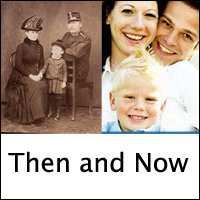 Tracing Diana Baumrind's Parenting Styles Through History! Unravelling the Essence of the Dominant Parenting Paradigms of the Western World |
Articles on Diana Baumrind's 3 Parenting Styles
 Diana Baumrind's 3 Styles of Parenting: Get a Full Understanding of Baumrind's 3 Archetypical Parents. |
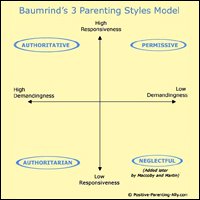 The Four Basic Styles of Parenting Taken a Step Further: Reviewing Diana Baumrind's Model with the Tool of High Awareness. |
Articles on the Authoritarian Parenting Style
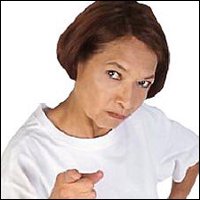 The Essence of the Authoritarian Parenting Style and the Long Term Effects of Strict Parenting! |
 A Psychological Profile on Authoritarian Parents! Understanding the Authoritarian Personality from Within! |
Articles on the Permissive Parenting Style
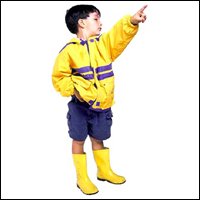 The Permissive Parenting Style Seen in an Existential Light. The Beingness of Permissive Parenting vs. the Beingness of Positive, Unconditional Parenting! |
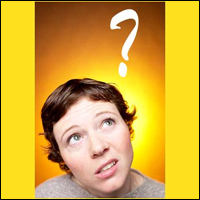 Understanding the nature of the permissive parenting style: Going beyond Diana Baumrind's idea of low demandingness and get deep insights into the psychology of permissive parents. |
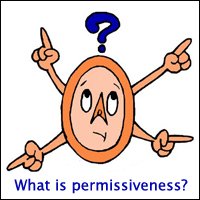 Permissive Parenting Historically and Psychologically: The Rise of 'Permissive' Parenting and the 3 Fear Based Indulgent Parenting Strategies! |
 A Psychological Profile on 3 Types of Permissive Parents: Understand Their Indulgent Behavior by Understanding Their Ego Fears! |
Articles on the Authoritative Parenting Style
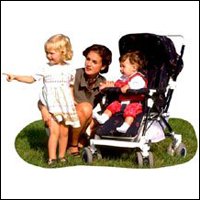 Deep Insights into the Authoritative Parenting Style along with Modern Perspectives on Diana Baumrind's Beloved 'Firm Parental Control'! |
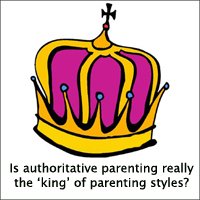 Academic Criticism of the Authoritative Parenting Style: Questioning Diana Baumrind's Celebration of High Control! |
Back to the top of this page about A Fascinating Historical View on the Authoritarian Parenting Style and Deep Insights into Controlling Parents
Go to the Positive Parenting Ally Homepage







